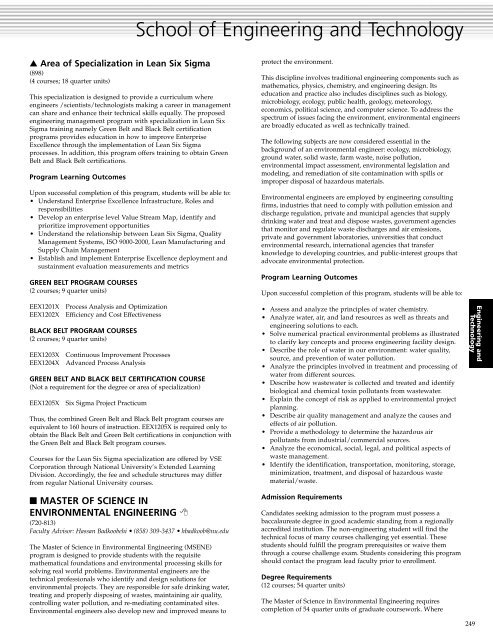Catalog 73 - National University
Catalog 73 - National University
Catalog 73 - National University
- No tags were found...
Create successful ePaper yourself
Turn your PDF publications into a flip-book with our unique Google optimized e-Paper software.
School of Engineering and Technology▲ Area of Specialization in Lean Six Sigma(898)(4 courses; 18 quarter units)This specialization is designed to provide a curriculum whereengineers /scientists/technologists making a career in managementcan share and enhance their technical skills equally. The proposedengineering management program with specialization in Lean SixSigma training namely Green Belt and Black Belt certificationprograms provides education in how to improve EnterpriseExcellence through the implementation of Lean Six Sigmaprocesses. In addition, this program offers training to obtain GreenBelt and Black Belt certifications.Program Learning OutcomesUpon successful completion of this program, students will be able to:• Understand Enterprise Excellence Infrastructure, Roles andresponsibilities• Develop an enterprise level Value Stream Map, identify andprioritize improvement opportunities• Understand the relationship between Lean Six Sigma, QualityManagement Systems, ISO 9000-2000, Lean Manufacturing andSupply Chain Management• Establish and implement Enterprise Excellence deployment andsustainment evaluation measurements and metricsGREEN BELT PROGRAM COURSES(2 courses; 9 quarter units)EEX1201XEEX1202XProcess Analysis and OptimizationEfficiency and Cost EffectivenessBLACK BELT PROGRAM COURSES(2 courses; 9 quarter units)EEX1203XEEX1204XContinuous Improvement ProcessesAdvanced Process AnalysisGREEN BELT AND BLACK BELT CERTIFICATION COURSE(Not a requirement for the degree or area of specialization)EEX1205XSix Sigma Project PracticumThus, the combined Green Belt and Black Belt program courses areequivalent to 160 hours of instruction. EEX1205X is required only toobtain the Black Belt and Green Belt certifications in conjunction withthe Green Belt and Black Belt program courses.Courses for the Lean Six Sigma specialization are offered by VSECorporation through <strong>National</strong> <strong>University</strong>’s Extended LearningDivision. Accordingly, the fee and schedule structures may differfrom regular <strong>National</strong> <strong>University</strong> courses.protect the environment.This discipline involves traditional engineering components such asmathematics, physics, chemistry, and engineering design. Itseducation and practice also includes disciplines such as biology,microbiology, ecology, public health, geology, meteorology,economics, political science, and computer science. To address thespectrum of issues facing the environment, environmental engineersare broadly educated as well as technically trained.The following subjects are now considered essential in thebackground of an environmental engineer: ecology, microbiology,ground water, solid waste, farm waste, noise pollution,environmental impact assessment, environmental legislation andmodeling, and remediation of site contamination with spills orimproper disposal of hazardous materials.Environmental engineers are employed by engineering consultingfirms, industries that need to comply with pollution emission anddischarge regulation, private and municipal agencies that supplydrinking water and treat and dispose wastes, government agenciesthat monitor and regulate waste discharges and air emissions,private and government laboratories, universities that conductenvironmental research, international agencies that transferknowledge to developing countries, and public-interest groups thatadvocate environmental protection.Program Learning OutcomesUpon successful completion of this program, students will be able to:• Assess and analyze the principles of water chemistry.• Analyze water, air, and land resources as well as threats andengineering solutions to each.• Solve numerical practical environmental problems as illustratedto clarify key concepts and process engineering facility design.• Describe the role of water in our environment: water quality,source, and prevention of water pollution.• Analyze the principles involved in treatment and processing ofwater from different sources.• Describe how wastewater is collected and treated and identifybiological and chemical toxin pollutants from wastewater.• Explain the concept of risk as applied to environmental projectplanning.• Describe air quality management and analyze the causes andeffects of air pollution.• Provide a methodology to determine the hazardous airpollutants from industrial/commercial sources.• Analyze the economical, social, legal, and political aspects ofwaste management.• Identify the identification, transportation, monitoring, storage,minimization, treatment, and disposal of hazardous wastematerial/waste.Engineering andTechnology■ MASTER OF SCIENCE INENVIRONMENTAL ENGINEERING (720-813)Faculty Advisor: Hassan Badkoobehi • (858) 309-3437 • hbadkoob@nu.eduThe Master of Science in Environmental Engineering (MSENE)program is designed to provide students with the requisitemathematical foundations and environmental processing skills forsolving real world problems. Environmental engineers are thetechnical professionals who identify and design solutions forenvironmental projects. They are responsible for safe drinking water,treating and properly disposing of wastes, maintaining air quality,controlling water pollution, and re-mediating contaminated sites.Environmental engineers also develop new and improved means toAdmission RequirementsCandidates seeking admission to the program must possess abaccalaureate degree in good academic standing from a regionallyaccredited institution. The non-engineering student will find thetechnical focus of many courses challenging yet essential. Thesestudents should fulfill the program prerequisites or waive themthrough a course challenge exam. Students considering this programshould contact the program lead faculty prior to enrollment.Degree Requirements(12 courses; 54 quarter units)The Master of Science in Environmental Engineering requirescompletion of 54 quarter units of graduate coursework. Where249
















